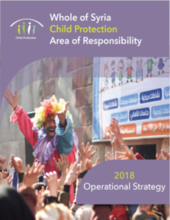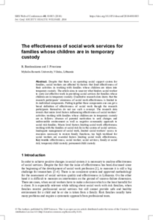Displaying 291 - 300 of 507
In this sample of 160 retained specially-trained public child welfare workers and former students, sources of stress and satisfaction were examined three and five years after the conclusion of the students’ work obligation.
This paper analyzes the perspectives of eleven social workers doing child protection work and examines the accounts of thirteen parents living with mental illness or addiction who have been involved in child custody investigations in Aotearoa New Zealand.
This report from the Child Protection Area of Responsibility (CP AoR) highlights the child protection needs and responses in Syria and includes objectives and targets for continued child protection interventions and strategies.
On the basis of qualitative interviews with 10 children about their experiences collaborating with child welfare professionals, this study has identified ways in which professionals can facilitate children's participation.
The aim of this paper is to describe findings from a survey which identified barriers and facilitators to collaboration between child welfare and adult mental health service providers.
This issue brief highlights the importance of understanding the concerns and needs of children and families in rural communities in the United States
This study explored whether the strength of caseworkers' engagement with families in the child-welfare system was associated with the caseworkers' academic degrees, job responsibilities and environments, and/or ethnicity.
The article aims to uncover what hinders social workers to carry out effective work in providing social services for families whose children are in temporary custody.
This brief documents the evaluation of an online training for Citizen Review Panel (CRP) members in one southeastern state in the United States.
This article, based on a unique mixed‐methods study of social work interventions in the UK and the influence of poverty, highlights a narrative from practitioners that argues that, as many poor families do not harm their children, it is stigmatizing to discuss a link between poverty and child abuse and neglect.



